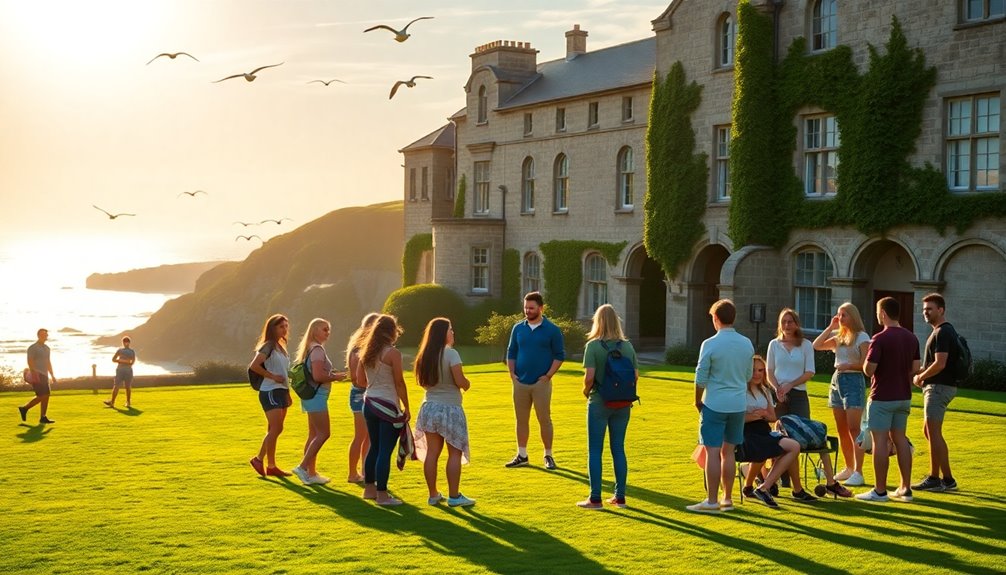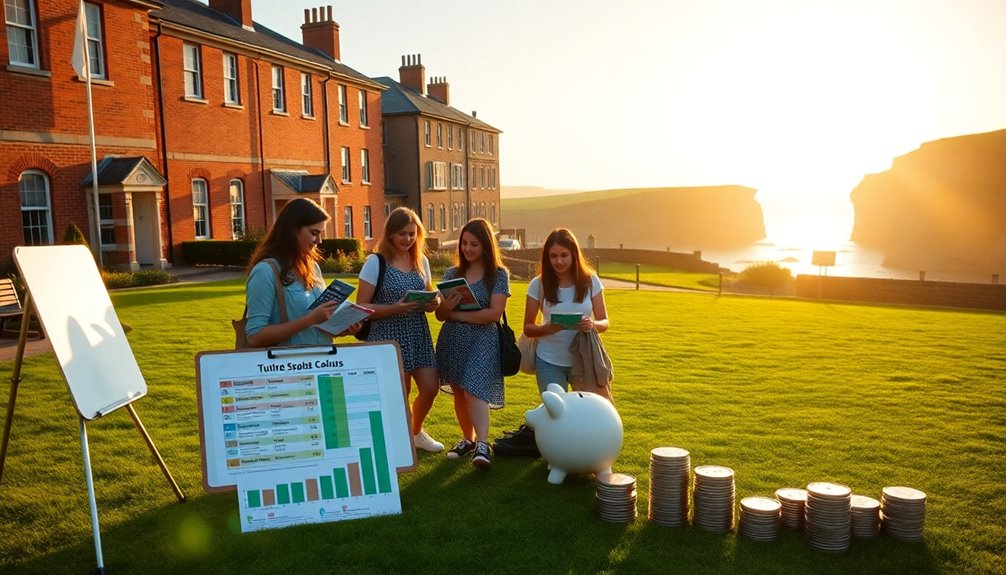
You’ll find Ireland ideal for summer English: immersive, low‑stress classes that push your speaking and real‑world fluency. Choose Dublin for intensive, structured lessons near city life; Galway for cultural immersion, conversation clubs and Connemara trips; or Cork for small classes and flexible homestays. Pick homestays for daily practice, residences for convenience, hostels for budget socializing, and weigh total cost and included excursions. Keep going to get practical tips on programs, visas and applications.
Highlights
- Choose schools in Dublin, Galway, or Cork for top-rated teaching, immersive activities, and convenient access to attractions.
- Prioritize small classes, experienced teachers, and conversation-focused lessons to accelerate speaking confidence.
- Select accommodation (homestay, residence, hostel) based on desired immersion level, independence, and budget.
- Compare total cost-per-week, included activities, and transparent fees to assess real value-for-money.
- Apply early, check visa requirements by course length, and secure travel insurance before booking flights.
Why Choose Ireland for Summer English Courses?
Because Ireland blends immersive English practice with a warm, low-stress atmosphere, you’ll improve faster while enjoying life outside the classroom. You’ll engage in cultural immersion through homestays, local cafes, and community events that push your conversation skills naturally. Coaches keep classes focused and practical, so you won’t waste time on irrelevant theory. Between lessons, you’ll explore scenic landscapes—cliff walks, coastal villages, and rolling green hills—that refresh your mind and fuel confident speaking. This blend of structured learning and adventurous downtime suits independent learners who want freedom, real-world fluency, and memorable summer experiences without sacrificing progress.
Top-Rated Summer English Schools in Dublin
Now that you know why Ireland is ideal for summer English study, let’s look at Dublin’s best schools that combine rigorous teaching with real-world practice. You’ll find institutions offering intensive courses, experienced teachers, and structured language immersion that push your speaking confidence. Choose schools near Dublin attractions so you can study by day and explore Georgian streets, galleries, and lively pubs by evening. Look for small classes, tailored feedback, and activities that let you practice English freely with peers. These top-rated options balance academic standards with cultural access, giving you the freedom to learn fast and live fully.
Best Summer Programs in Galway for International Students
If you want immersive summer study paired with a vibrant student life, Galway’s programs deliver focused English instruction alongside hands-on cultural experiences. You’ll find intensive courses that sharpen speaking and listening, plus festival-driven outings that immerse you in local music and arts. Stay with host families or choose shared apartments to balance independence and support. Expect structured language exchange meetups, conversational clubs, and guided excursions to Connemara for authentic cultural immersion. Programs cater to motivated learners who crave freedom: flexible schedules, optional activities, and advice on maneuvering the city. You’ll leave fluent, confident, and ready to keep exploring.
Highly Recommended Schools in Cork and Surrounding Areas
Looking for high-quality summer English programs near Cork? You’ll find schools that balance rigorous language immersion with exploration of Cork attractions like Blarney Castle and seaside villages. Choose institutions offering small classes, experienced tutors, and flexible homestays so you can live freely while improving fluency. Expect cultural outings, conversation-focused lessons, and practical workshops that boost confidence quickly. Local staff help you arrange independent excursions and authentic experiences, ideal if you want autonomy. Check accreditation, student reviews, and extracurricular options before you book. These Cork-area programs are travel-savvy, student-focused, and built to maximize learning without compromising your sense of freedom.
Intensive vs. Part-Time Summer Courses: Which Is Right for You?

Which pace suits your goals: full-throttle immersion or steady, manageable progress? You’ll pick intensive if you want rapid gains, daily practice, and intensive benefits like accelerated fluency and confidence for tight schedules. Choose part-time when you crave balance: morning classes, afternoons free to explore cities, and part time flexibility to work, travel, or relax without falling behind. Think about stamina, social goals, and how you learn best—marathon sessions or consistent, lighter steps. Either way, pick schools offering clear syllabuses, small classes, and cultural activities so your English improves while you roam and enjoy Ireland.
Accommodation Options: Homestay, Residence, and Hostels Compared
Choosing where you’ll stay in Ireland shapes both your language practice and your budget, so you’ll want to weigh homestays, residences, and hostels carefully. A homestay gives you daily immersion with a local family, a residence offers campus convenience and structured support, and hostels are the most budget-friendly option for socializing and meeting other students. Think about how much local contact, independence, and cost you need to pick the right fit.
Homestay: Local Family Experience
While staying with an Irish family you’ll get more than a room—you’ll get daily language practice, cultural insights, and a supportive base that helps you settle faster than most other options. You’ll enjoy true cultural immersion and family bonding while keeping independence: choose outings, study quietly, or join conversations over dinner. Hosts often guide you to local spots, practical routines, and authentic phrases you won’t learn in class. Homestay rules are clear, costs are predictable, and safety is higher than informal stays. If you want real-life practice, personal support, and flexible freedom, homestay is a top pick.
Residence: Campus Convenience Benefits
Residence halls put you at the centre of campus life, offering quick access to classes, libraries, and social events so you’ll save commute time and stay plugged into student activities. You’ll enjoy reliable campus amenities—study rooms, gyms, cafés—that make independent living simple and social. Rooms vary from en-suite to shared, letting you choose privacy or community. Staffed reception and secure entry systems prioritise student safety, so you can explore freely without constant worry. Living on campus speeds friendships, supports language practice, and keeps logistics minimal, making it ideal if you want freedom with sensible structure during your summer study.
Hostels: Budget and Socializing
If campus life feels a bit structured or pricey, hostels offer a budget-friendly, social alternative that suits students keen to meet travellers and practise English around the clock. You’ll choose budget accommodations that prioritise flexibility—shared dorms, communal kitchens, drop-in events—so you can spend more on experiences than rent. Hostels are hubs for social interaction: evening hangouts, walking tours and language exchanges make practising colloquial English natural and frequent. You should vet reviews for cleanliness and noise, pick hostels near transit, and expect a lively atmosphere. For independent students craving camaraderie and low cost, hostels are ideal.
Extracurricular Activities and Cultural Excursions Offered by Schools
You’ll want to choose a school that balances on-campus sports and clubs with off-site day trips so you’re improving English both in class and in real-life settings. Look for programs that run regular football, hiking or drama sessions alongside guided tours to castles, coastal towns and cultural landmarks. That mix keeps your week active, boosts conversation skills, and gives you authentic Irish experiences.
On-Campus Sports & Clubs
Many schools offer a tight-knit mix of sports teams and clubs that’ll keep you active, help you make friends, and let you explore Irish culture beyond the classroom. You’ll find structured sports teams—soccer, Gaelic games, rugby, tennis—matched with flexible club activities like drama, music, photography, and conversation groups. Staff balance safety and independence, so you can push limits without losing support. Regular on-campus events and showcases let you display skills and connect with peers. Choose programs that fit your energy and schedule, and you’ll leave fitter, more confident, and with a network ready for future travel or study.
Day Trips & Tours
Day trips and guided tours are where classroom learning meets real Ireland—expect curated excursions to castles, coastal villages, museums, and key cultural sites that deepen your language skills and local knowledge. You’ll join day trips that balance structure and spontaneity: cliffside walks, historic house visits, market mornings, and ferry crossings. City tours focus on conversation practice with local guides, cafe stops, and independent time to explore. Schools design routes to boost vocabulary, confidence, and cultural curiosity while giving you freedom to choose activities. Clear safety, transport, and small-group levels mean you’ll learn boldly and return inspired.
Pricing, Scholarships, and Value-for-Money Considerations

While summer English school prices in Ireland can vary widely depending on location, accommodation, and included activities, you should focus on total cost-per-week and what’s actually covered rather than headline tuition alone. You’ll compare pricing structures—day rates, full-board, activity packages—and note hidden fees like materials or exam costs. Seek schools with clear refund policies and transparent extras. Look for scholarship opportunities and early-bird discounts; many programs offer merit or need-based aid that widens choice. Think value-for-money: quality teaching, small classes, relevant excursions, and flexible accommodation tell you where your budget truly buys freedom and growth.
Application Process, Visa Guidance, and Enrollment Tips
Because staying organized from the start will save you time and stress, begin your application with a clear timeline and checklist: confirm program dates, entry requirements, and deadlines; gather ID, transcripts, and proof of language level; and prepare any additional documents like parental consent or medical forms. You’ll follow application timelines and meet document requirements, apply early to secure preferred courses and accommodation, and check visa rules—short stays often need a tourist visa, longer courses may require student permission. Book flights after visa approval, purchase travel insurance, and stay flexible so you can travel confidently and independently.
Some Questions Answered
Do Schools Provide Airport Pickup for International Students?
Yes — many schools offer airport transfer and arrival assistance for international students. You’ll get clear pickup details, meeting points, and sometimes a staff escort to accommodation so you can relax after travel. This service’s availability and cost vary by school and flight time, so check policies and book ahead. Choosing a program that handles transfers gives you freedom to focus on settling in and starting your course confidently.
Are Special Dietary Needs Accommodated in Homestays?
Yes — homestays usually accommodate special dietary needs. You’ll share your dietary preferences when booking, and hosts adjust meals or offer alternatives within homestay options. Be clear about allergies, religious rules, vegan or gluten-free needs; schools vet families and confirm capabilities. You’ll get practical, travel-savvy guidance before arrival, but stay proactive: bring supplements or favorites if you want freedom and certainty about what you’ll eat away from campus.
Can I Combine English Courses With Local Volunteer Work?
Absolutely — you can combine courses with volunteer work; it’s a no-brainer that’ll light your soul like a lighthouse. You’ll join meaningful community engagement projects while sharpening language and practical skill development, and you’ll still get quality classroom time. Programs are flexible, travel-savvy, and student-focused, so you won’t feel boxed in. Expect organized placements, cultural immersion, clear schedules, and support from coordinators who want you to explore, learn, and grow freely.
What Medical Facilities Are Available Near School Campuses?
You’ll find nearby hospitals and health services within easy reach of most campuses, with public hospitals, private clinics and 24/7 emergency departments typically a short bus or taxi ride away. Schools keep up-to-date lists, emergency contacts and can arrange appointments or transport. You’ll have access to GPs, travel clinics, and pharmacies for routine care, plus student support for insurance claims, ensuring you can explore freely knowing medical help’s close at hand.
Do Schools Offer Flight Booking Assistance or Travel Insurance?
Yes — many schools provide flight assistance and outline insurance options to help you travel confidently. They’ll often book or advise on flights, coordinate arrival transfers, and recommend or partner with insurers offering student-focused coverage for medical, cancellation, and baggage. Expect clear steps to add protection, optional policies, and guidance on what’s required for visas. You’ll get practical, freedom-minded support so you can focus on studying and exploring.
Summing Everything Up
You’ve got everything you need to pick the perfect summer English course in Ireland, so trust your gut and jump in—don’t let the grass grow under your feet. Whether you want immersive intensity in Dublin, creative vibes in Galway, or a friendly Cork experience, choose a program that fits your learning goals, budget, and lifestyle. Plan early, check visa rules, and get ready to improve your English while experiencing Irish culture firsthand.
